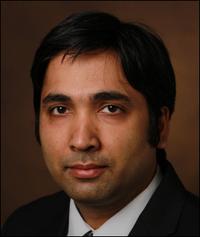Abhishek Dubey
Senior Research Scientist
Associate Professor of Computer Science
Associate Professor of Computer Engineering

Dr. Abhishek Dubey is an Associate Professor of Electrical Engineering, Computer Engineering and Computer Science at Vanderbilt University, Senior Research Scientist at the Institute for Software Integrated Systems. Abhishek directs the ScopeLab at the Institute for Software Integrated Systems and is the co-lead of Vanderbilt Institute for Smart Cities Operation and Research (VISOR). His research focuses on the resilient design and operation of complex large-scale transportation and electrical cyber-physical systems. In particular he emphasizes decision-theoretic methods, component-based software engineering, anomaly detection and fault diagnosis, resilience and recovery, and decentralized operations for these CPS. He currently leads smart and connected community research efforts focusing on design and optimization of public transit systems in Chattanooga, TN and Nashville, TN through his group smarttransit.ai and the emergency response system optimization through his group statresp.ai.
His key contributions include a robust incident prediction and dispatch system developed for Nashville Fire Department, a privacy-preserving decentralized system for peer-to-peer energy exchange, and online fault detection and isolation in breaker assemblies in power transmission lines. His other contributions include middleware for online fault-detection and recovery in software-intensive distributed systems and a robust software model for building cyber-physical applications, along with spatial and temporal separation among different system components, which guarantees fault isolation. His work has been funded by the National Science Foundation, NASA, DOE, ARPA-E, AFRL, DARPA, Siemens, and Cisco through grants of more than 8 million as PI and 27 million dollars as Co-PI. Overall, he has published over 150 articles with an h − index of 29.
Abhishek completed his Ph.D. in Electrical Engineering from Vanderbilt University in 2009. He received his M.S. in Electrical Engineering from Vanderbilt University in August 2005 and completed his undergraduate studies in Electrical Engineering from the Indian Institute of Technology, Banaras Hindu University, India in May 2001.
Education
Ph.D., Electrical Engineering
Vanderbilt University
M.S., Electrical Engineering
Vanderbilt University
B.Tech., Electrical Engineering
Indian Institute of Technology, Banaras Hindu University
Projects
- Optimizing Multi-Modal Fixed Fleet Transit Operations
- Statistical Decision Procedures for Emergency Response
- TRANSAX: Blockchain-based Middleware for Transactive Energy Systems
- AI-Engine for Optimizing Integrated Service Mixed Fleet Transit Operations
- EdgeNet: An online Edge Computing Based Generative Anomaly Detection and Prognostics Solution for Networked Equipment at Customer Premises
- III: Small: Collaborative Research: Summarizing Heterogeneous Crowdsourced & Web Streams Using Uncertain Concept Graphs
- NeTS: JUNO2: STEAM: Secure and Trustworthy Framework for Integrated Energy and Mobility in Smart Connected Communities
- RAPID: Collaborative Research: Addressing Transit Accessiblity and Public Health Challenges due to COVID-19
- SAFE-Ride -- A regional transit Coalition for Managing Safe and Efficient Transit Operations using AI
- SCC-IRG Track 1: Mobility for all - Harnessing Emerging Transit Solutions for Underserved Communities
- High-dimensional Data-driven Energy optimization for Multi-Modal transit Agencies (HD-EMMA)
- Spatio-Temporal AI Inference Engines for System-Level Reliability
- CAREER: Robust Online Decision Procedures for Societal Scale CPS
- AI-Engine for Adaptive Sensor Fusion For Traffic
- Travel: SCR: Small: NSF Student Travel Grant for 2023 IEEE International Conference on Smart Computing
- SCC-IRG Track 1: Mobility for all - Harnessing Emerging Transit Solutions for Underserved Communities
- Integrated Software Environment for Online Edge Computing Based Generative Anomaly Detection
- Influencing Mode Shift Through Behavioral Change Strategies - Phase II
- Designing Multimodal Transit for Blue Oval City and Volkswagen
- Fixed-Line Transit 2.0: Real-Time Optimization of High-Frequency Transit Services
- AI-Guided Evolution of Model-Based Software Systems with Structured Knowledge Representations